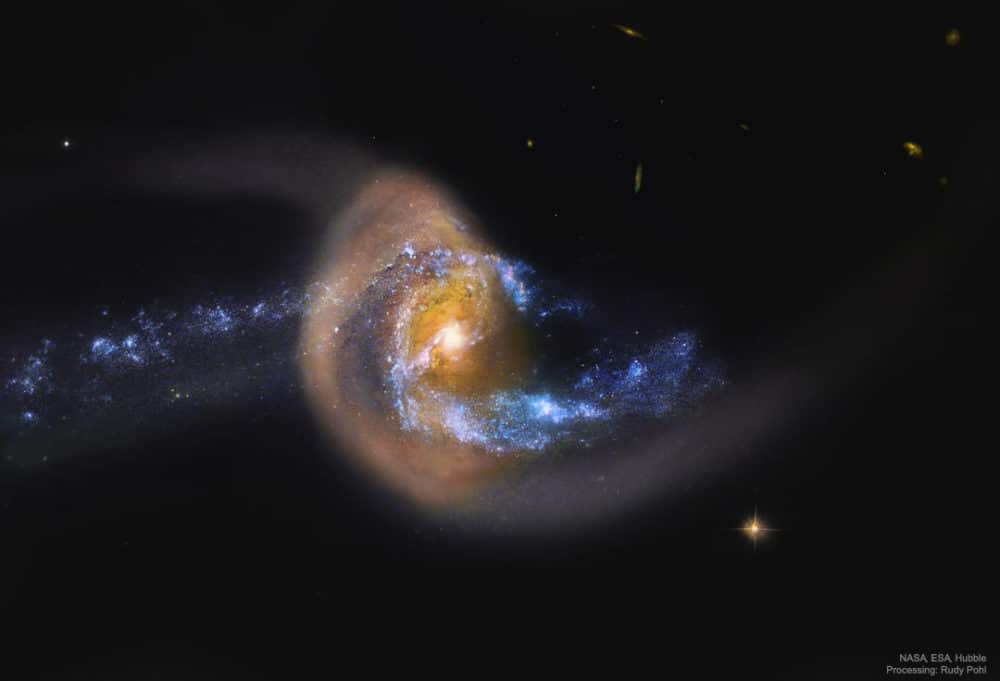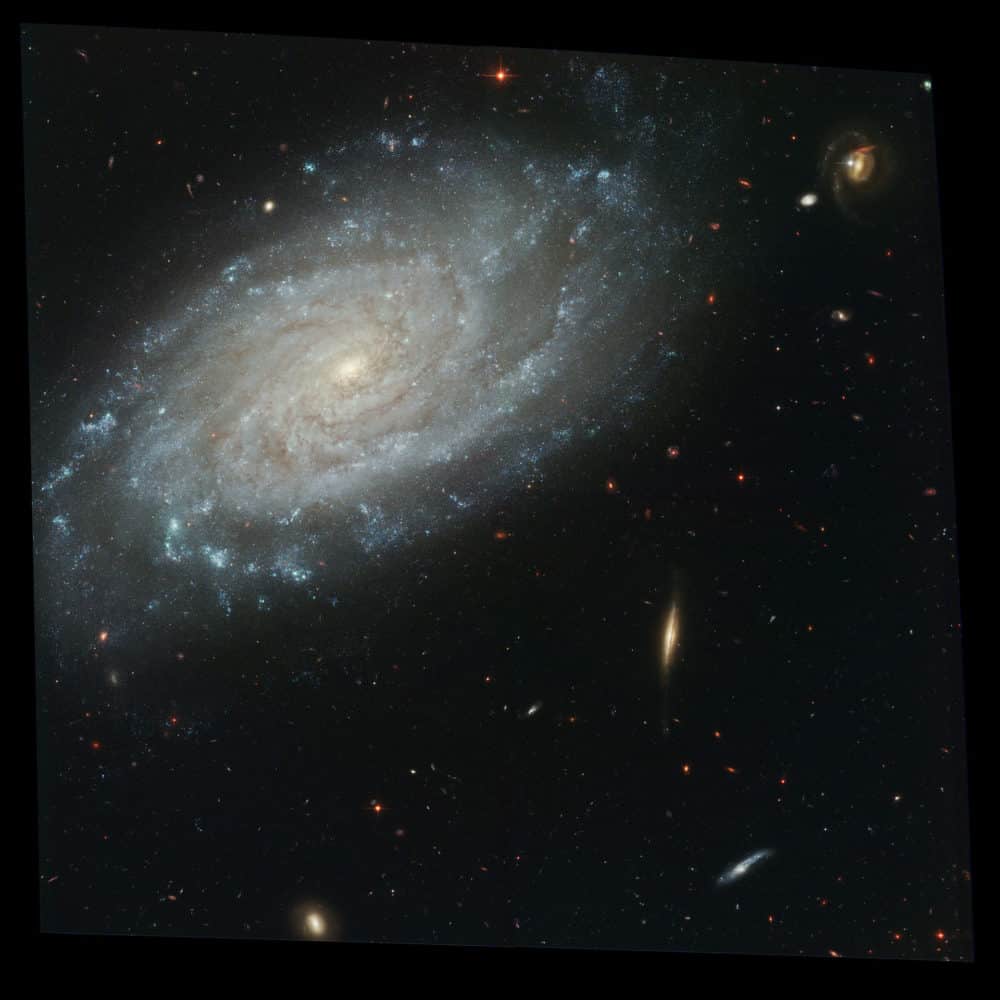Blog
NGC 2074 is a magnitude ~8 emission nebula in the Tarantula Nebula located in the constellation Dorado. It was discovered on 3 August 1826 by James Dunlop and around 1835 by John Herschel. It is described as being “pretty bright, pretty large, much extended, [and having] 5 stars involved”. Some of the objects catalogued by Herschel before 1847 do not have a discovery date listed, and NGC 2074 is one of them. Though its inclusion in the catalog of objects observed in the Large Magellanic Cloud which involves observations carried out between 2 November 1836 and 26 March 1837 shows it must not have been discovered later than that. The observation of NGC 2074 by Dunlop was not identified as this object until recently. NGC 2074 is located around 170,000 light-years (1.1×1010 AU) away. The area has a lot of raw stellar creation, possibly triggered by a nearby supernova explosion and is on the edge of a dark molecular cloud which is an incubator for the birth of new stars.
Cyril Garrett Neville (born October 10, 1948) is an American percussionist and vocalist who first came to prominence as a member of his brother Art Neville‘s funky New Orleans-based band, The Meters. He joined Art in the Neville Brothers band upon the dissolution of the Meters.
He has appeared on recordings by Bob Dylan, Robbie Robertson, Edie Brickell, Willie Nelson, Dr. John and The New Orleans Social Club among others.
Neville wrote an article for the December 16, 2005 edition of CounterPunch, titled “Why I’m Not Going Back To New Orleans” and was featured in the 2006 documentary film New Orleans Music in Exile. After Hurricane Katrina he moved to Austin, Texas but currently lives in Slidell, Louisiana.
Soul Rebels Brass Band featured Neville as a special guest on their Rounder Records debut record, Unlock Your Mind, released on January 31, 2012. The Soul Rebels’ name was conceived by Neville at the New Orleans venue Tipitina’s, where the band was opening.
In 2005, Neville joined up with Tab Benoit for the Voice of the Wetlands Allstars to bring awareness to Louisiana’s rapid loss of wetlands along the Gulf Coast. The band also features Waylon Thibodeaux, Johnny Sansone, Anders Osborne, Monk Boudreaux, George Porter, Jr., Johnny Vidacovich, and Dr. John. The band has become a main feature at the annual New Orleans Jazz & Heritage Festival.
more...John Prine (born October 10, 1946) is an American country folk singer-songwriter. He has been active as a composer, recording artist, and live performer since the early 1970s, and is known for an often humorous style of country music that has elements of protest and social commentary.
Born and raised in Maywood, Illinois, Prine learned to play the guitar at the age of 14. He attended classes at Chicago’s Old Town School of Folk Music.[1] After serving in West Germany with the U.S. armed forces, he moved to Chicago in the late 1960s, where he worked as a mailman, writing and singing songs as a hobby.
A member of Chicago’s folk revival, he was discovered by Kris Kristofferson, resulting in the production of Prine’s self-titled debut album with Atlantic Records in 1971. After receiving critical acclaim, Prine focused on his musical career, recording three more albums for Atlantic. He then signed to Asylum Records, where he recorded an additional three albums. In 1984 he co-founded Oh Boy Records, an independent record label with which he would release most of his subsequent albums. After his battle with squamous cell cancer in 1998, Prine’s vocals deepened into a gravelly voice.
Widely cited as one of the most influential songwriters of his generation, Prine is known for humorous lyrics about love, life, and current events, as well as serious songs with social commentary, or which recollect melancholy tales from his life. Prine is the son of William Prine and Verna Hamm. He started playing guitar at age 14, taught by his brother, David. He attended classes at Chicago’s Old Town School of Folk Music. Prine attended Proviso East High School in Maywood, Illinois. He was a mailman for five years and served in the Army during the Vietnam War era, serving in Germany, before beginning his musical career in Chicago.
In the late-1960s, while Prine was delivering mail, he began to sing at open mic evenings at the Fifth Peg on Armitage Avenue in Chicago. Prine was initially a spectator, reluctant to perform, but eventually did so in response to a “You think you can do better?” comment made to him by another performer. Chicago Sun-Times movie critic Roger Ebert heard him there and wrote the first review Prine ever received, calling him a great songwriter. He became a central figure in the Chicago folk revival, which also included such singer-songwriters as Steve Goodman, Michael Peter Smith, Bonnie Koloc, Jim Post, Tom Dundee, Anne Hills and Fred Holstein. Joined by such established musicians as Jethro Burns and Bob Gibson, Prine performed frequently at a variety of Chicago clubs—including the Earl of Old Town, the Quiet Knight, Dangling Conversation, Somebody Else’s Troubles, The Fifth Peg, and the Bulls.
more...Edward Joseph Blackwell (October 10, 1929 – October 7, 1992) was an American jazz drummer born in New Orleans, Louisiana, known for his extensive, influential work with Ornette Coleman.
Blackwell’s early career began in New Orleans in the 1950s. He played in a bebop quintet that included pianist Ellis Marsalis and clarinetist Alvin Batiste. There was also a brief stint touring with Ray Charles. The second line parade music of New Orleans greatly influenced Blackwell’s drumming style and could be heard in his playing throughout his career.
Blackwell first came to national attention as the drummer with Ornette Coleman‘s quartet around 1960, when he took over for Billy Higgins in the quartet’s stand at the Five Spot in New York City. He is known as one of the great innovators of the free jazz of the 1960s, fusing New Orleans and African rhythms with bebop. In the 1970s and 1980s Blackwell toured and recorded extensively with fellow Ornette Quartet veterans Don Cherry, Charlie Haden, and Dewey Redman in the quartet Old and New Dreams.
more...Thelonious Sphere Monk (/θəˈloʊniəs/, October 10, 1917 – February 17, 1982) was an American jazz pianist and composer. He had a unique improvisational style and made numerous contributions to the standard jazz repertoire, including “‘Round Midnight“, “Blue Monk“, “Straight, No Chaser“, “Ruby, My Dear“, “In Walked Bud“, and “Well, You Needn’t“. Monk is the second-most-recorded jazz composer after Duke Ellington, which is particularly remarkable as Ellington composed more than a thousand pieces, whereas Monk wrote about 70.
Monk’s compositions and improvisations feature dissonances and angular melodic twists and are consistent with his unorthodox approach to the piano, which combined a highly percussive attack with abrupt, dramatic use of switched key releases, silences, and hesitations. His style was not universally appreciated; the poet and jazz critic Philip Larkin dismissed him as “the elephant on the keyboard”.
Monk was renowned for a distinct look which included suits, hats, and sunglasses. He was also noted for an idiosyncratic habit during performances: while other musicians continued playing, Monk stopped, stood up, and danced for a few moments before returning to the piano.
Monk is one of five jazz musicians to have been featured on the cover of Time magazine (the others being Louis Armstrong, Dave Brubeck, Duke Ellington and Wynton Marsalis). Thelonious Sphere Monk was born two years after his sister Marion on October 10, 1917, in Rocky Mount, North Carolina, and was the son of Thelonious and Barbara Monk. His poorly written birth certificate misspelled his first name as “Thelious” or “Thelius”. It also did not list his middle name, taken from his maternal grandfather, Sphere Batts.
“Monk’s usual piano touch was harsh and percussive, even in ballads. He often attacked the keyboard anew for each note, rather than striving for any semblance of legato. Often seemingly unintentional seconds embellish his melodic lines, giving the effect of someone playing while wearing work gloves. […] He hit the keys with fingers held flat rather than in a natural curve, and held his free fingers high above the keys. […] Sometimes he hit a single key with more than one finger, and divided single-line melodies between the two hands.” In contrast with this unorthodox approach to playing, he could play runs and arpeggios with great speed and accuracy. He also had good finger independence, allowing him to play a melodic line and a trill simultaneously in his right hand.
Monk often used parts of whole tone scales, played either ascending or descending, and covering several octaves. He also had extended improvisations that featured parallel sixths (he also used these in the themes of some of his compositions). His solos also feature space and long notes. Unusually for a bebop-based pianist, as an accompanist and on solo performances he often employed a left-hand stride pattern. A further characteristic of his work as an accompanist was his tendency to stop playing, leaving a soloist with just bass and drums for support.
Monk had a particular proclivity for the key of B flat. All of his many blues compositions, including “Blue Monk,” “Misterioso,” “Blues Five Spot,” and “Functional,” were composed in B flat; in addition, his signature theme, “Thelonious,” largely consists of an insistently repeated B-flat tone.
Yom Kippur Afternoon Service 415pm at Mt Zion
more...Is this galaxy jumping through a giant ring of stars? Probably not. Although the precise dynamics behind the featured image is yet unclear, what is clear is that the pictured galaxy, NGC 7714, has been stretched and distorted by a recent collision with a neighboring galaxy. This smaller neighbor, NGC 7715, situated off to the left of the featured frame, is thought to have charged right through NGC 7714. Observations indicate that the golden ring pictured is composed of millions of older Sun-like stars that are likely co-moving with the interior bluer stars. In contrast, the bright center of NGC 7714 appears to be undergoing a burst of new star formation. The featured image was captured by the Hubble Space Telescope. NGC 7714 is located about 130 million light years away toward the constellation of the Two Fish (Pisces). The interactions between these galaxies likely started about 150 million years ago and should continue for several hundred million years more, after which a single central galaxy may result.
more...John Winston Ono Lennon MBE (born John Winston Lennon, 9 October 1940 – 8 December 1980) was an English singer, songwriter and peace activist who gained worldwide fame as the founder, co-lead vocalist, and rhythm guitarist of the Beatles. His songwriting partnership with Paul McCartney remains the most successful in history. In 1969, he started the Plastic Ono Band with his second wife, Yoko Ono. After the Beatles disbanded in 1970, Lennon continued as a solo artist and as a collaborator of Ono’s music.
Born in Liverpool, Lennon became involved in the skiffle craze as a teenager. In 1957, he formed his first band, the Quarrymen, which evolved into the Beatles in 1960. He was initially the group’s de facto leader, a role gradually rescinded to McCartney. Starting in 1967, Lennon’s lyrics began to espouse a pacifist message, and some of his songs were soon adopted as anthems by the anti-war movement and the larger counterculture. From 1968 to 1972, he produced more than a dozen records with Ono, including a trilogy of avant-garde albums, his first solo LP John Lennon/Plastic Ono Band, and the international top 10 singles “Give Peace a Chance“, “Instant Karma!“, “Imagine” and “Happy Xmas (War Is Over)“.
Lennon was renowned for the rebellious nature and acerbic wit in his music, writing, drawings, on film and in interviews. He was controversial through his political and peace activism. After moving to New York City in 1971, his criticism of the Vietnam War resulted in a three-year attempt by the Nixon administration to deport him. In 1975, Lennon disengaged from the music business to raise his infant son Sean, and in 1980, returned with the Ono collaboration Double Fantasy. He was shot and killed in the archway of his Manhattan apartment building three weeks after the album’s release.
By 2018, Lennon’s solo equivalent album sales had exceeded 72 million units worldwide . In 2002, Lennon was voted eighth in a BBC poll of the 100 Greatest Britons, and in 2008, Rolling Stone ranked him the fifth-greatest singer of all time. In 1987, he was inducted into the Songwriters Hall of Fame. Lennon was inducted into the Rock and Roll Hall of Fame twice, as a member of the Beatles in 1988 and as a solo artist in 1994.
more...Abdullah Ibrahim (born Adolph Johannes Brand on 9 October 1934 and formerly known as Dollar Brand) is a South African pianist and composer. His music reflects many of the musical influences of his childhood in the multicultural port areas of Cape Town, ranging from traditional African songs to the gospel of the AME Church and ragas, to more modern jazz and other Western styles. Ibrahim is considered the leading figure in the subgenre of Cape jazz. Within jazz, his music particularly reflects the influence of Thelonious Monk and Duke Ellington. He is known especially for “Mannenberg“, a jazz piece that became a notable anti-apartheid anthem.
During the apartheid era in the 1960s Ibrahim moved to New York City and, apart from a brief return to South Africa in the 1970s, remained in exile until the early ’90s. Over the decades he has toured the world extensively, appearing at major venues either as a solo artist or playing with other renowned musicians, including Max Roach, Carlos Ward and Randy Weston, as well as collaborating with classical orchestras in Europe. With his wife, the jazz singer Sathima Bea Benjamin, he is father to the New York underground rapper Jean Grae, as well as to a son, Tsakwe. Ibrahim was born in Cape Town on 9 October 1934, and was baptized Adolph Johannes Brand. He attended Trafalgar High School in Cape Town’s District Six, and began piano lessons at the age of seven, making his professional debut at 15. He is of mixed-race heritage, making him a Coloured person according to the South African government. His mother played piano in a church, the musical style of which would remain an influence; in addition, he learned to play several genres of music during his youth in Cape Town, including marabi, mbaqanga, and American jazz. He became well known in jazz circles in Cape Town and Johannesburg. In 1959 and 1960, Ibrahim played with the Jazz Epistles group in Sophiatown, alongside saxophonist Kippie Moeketsi, trumpeter Hugh Masekela, trombonist Jonas Gwangwa (who were all in the orchestra of the musical King Kong that opened in Johannesburg in February 1959), bassist Johnny Gertze and drummer Makaya Ntshoko; in January 1960, the six musicians went into the Gallo studio and recorded the first full-length jazz LP by Black South African musicians, Jazz Epistle Verse One, with 500 copies being produced. Although the group avoided explicitly political activity, the apartheid government was suspicious of it and other jazz groups, and targeted them heavily during the increase in state repression following the Sharpeville massacre, and eventually, the Jazz Epistles broke up.
Yusef Abdul Lateef (born William Emanuel Huddleston; October 9, 1920 – December 23, 2013) was an American jazz multi-instrumentalist, composer, and prominent figure among the Ahmadiyya Community in America.
Although Lateef’s main instruments were the tenor saxophone and flute, he also played oboe and bassoon, both rare in jazz, and also used a number of non-western instruments such as the bamboo flute, shanai, shofar, xun, arghul and koto. He is known for having been an innovator in the blending of jazz with “Eastern” music. Peter Keepnews, in his New York Times obituary of Lateef, wrote that the musician “played world music before world music had a name”.
Lateef wrote and published a number of books including two novellas entitled A Night in the Garden of Love and Another Avenue, the short story collections Spheres and Rain Shapes, also his autobiography, The Gentle Giant, written in collaboration with Herb Boyd. Along with his record label YAL Records, Lateef owned Fana Music, a music publishing company. Lateef published his own work through Fana, which includes Yusef Lateef’s Flute Book of the Blues and many of his own orchestral compositions.
Lateef was born in Chattanooga, Tennessee. His family moved, in 1923, to Lorain, Ohio, and again in 1925, to Detroit, Michigan, where his father changed the family’s name to “Evans”.
Throughout his early life Lateef came into contact with many Detroit-based jazz musicians who went on to gain prominence, including vibraphonist Milt Jackson, bassist Paul Chambers, drummer Elvin Jones and guitarist Kenny Burrell. Lateef was a proficient saxophonist by the time of his graduation from high school at the age of 18, when he launched his professional career and began touring with a number of swing bands. The first instrument he bought was an alto saxophone but after a year he switched to the tenor saxophone, influenced by the playing of Lester Young.
more...Dionisio Ramón Emilio Valdés Amaro (October 9, 1918 – March 22, 2013), better known as Bebo Valdés, was a Cuban pianist, bandleader, composer and arranger. He was a central figure in the golden age of Cuban music, led two famous big bands, and was one of the “house” arrangers for the Tropicana Club.
Bebo Valdés was born Dionisio Ramón Emilio Valdés Amaro on October 9, 1918, in the village of Quivicán, Cuba, near Havana. He started his career as a pianist in the nightclubs of Havana during the 1940s. He replaced René Hernández as pianist and arranger in Julio Cueva‘s band. In October 1946 the band recorded “Rareza del Siglo”, one of Bebo’s most famous mambos. From 1948 to 1957 he worked as pianist and arranger for the vedette Rita Montaner, who was the lead act in the Tropicana cabaret. His orchestra, Sabor de Cuba, and that of Armando Romeu, alternated at the Tropicana, backing singers such as Benny Moré and Pío Leyva. Valdés played a role in the adaptation of the mambo into the big band format (it was previously performed by charangas) during the late 1940s and 1950s, and developed a new rhythm to compete with Perez Prado‘s mambo, called the batanga. Valdés was also an important figure in the incipient Afro-Cuban jazz scene in Havana, taking part in sessions commissioned by American producer Norman Granz during 1952. These sessions yielded the famous improvised piece “Con Poco Coco” among others, which served as a precedent to Panart‘s descarga sessions (with one exception). In the late 1950s he recorded with Nat “King” Cole. In 1960, accompanied by Sabor de Cuba’s lead vocalist Rolando Laserie, Bebo defected from Cuba to Mexico. He then lived briefly in the United States before touring Europe, and eventually settled in Stockholm, where he lived until 2007. In Sweden he was instrumental in spreading the techniques of Cuban music and Latin jazz.
more...NGC 3370 (also known as UGC 5887 or Silverado Galaxy) is a spiral galaxy about 98 million light-years away in the constellationLeo. It is comparable to our own Milky Way both in diameter (100,000 light years) and mass (1011 solar masses). NGC 3370 exhibits an intricate spiral arm structure surrounding a poorly defined nucleus. NGC 3370 was likely discovered by William Herschel, who provided it with the designation II 81. His son John later designated it 750. William Herschel cataloged I 80 to NGC 3348 before and II 82 to NGC 3455 after NGC 3370.
Roddis Franklin Drake (October 8, 1932 – July 29, 1988) professionally known as Pete Drake, was a Nashville-based American record producer and pedal steel guitar player.
One of the most sought-after backup musicians of the 1960s, Drake played on such hits as Lynn Anderson‘s “Rose Garden“, Charlie Rich‘s “Behind Closed Doors“‘ Bob Dylan‘s “Lay Lady Lay“‘ and Tammy Wynette‘s “Stand by Your Man“. Drake was born in Augusta, Georgia, the son of a Pentecostal preacher, in 1932. In 1950 he drove to Nashville, heard Jerry Byrd on the Grand Ole Opry, and was inspired to buy a steel guitar. Later in the 1950s he organized the country music band Sons of the South in Atlanta, Georgia, which included future country stars like Jerry Reed, Doug Kershaw, Roger Miller, Jack Greene, and Joe South.
In 1959 he moved to Nashville, joined the Nashville A-Team, and went on the road as a backup musician for Don Gibson, Marty Robbins. and others. In 1964 he had an international hit on Smash Records with his “talking steel guitar” playing on Bill Anderson’s 1963 album Still.
The single, “Forever“, charted in March 1964 and reached #25 in the Billboard Hot 100, eventually sold over one million copies, and was awarded a gold disc. His innovative use of what would be called the talk box, later used by Peter Frampton, Joe Walsh, Roger Troutman and Jeff Beck, added novel effects to the pedal steel guitar. The album Pete Drake and His Talking Steel Guitar, harkened back to the sounds of Alvino Rey and his wife Luise King, who first modulated a guitar tone with the signal from a throat microphone in 1939. The unique sound of the talk box with a steel guitar was new in the 1960s, and it made the sounds of vocalizing along with the strings of the steel guitar.
more...Park Frederick “Pepper” Adams III (October 8, 1930 – September 10, 1986) was an American jazz baritone saxophonist and composer. He composed 42 pieces, was the leader on eighteen albums spanning 28 years, and participated in 600 sessions as a sideman. He worked with an array of musicians, and had especially fruitful collaborations with trumpeter Donald Byrd and as a member of the Thad Jones/Mel Lewis Big Band. Pepper Adams was born in Highland Park, Michigan, to father Park Adams II and mother Cleo Marie Coyle. Both of his parents were college graduates, with each spending some time at the University of Michigan. Due to the onset of the Great Depression, Adams’ parents separated to allow his father to find work without geographic dependence. In the fall of 1931 Adams moved with his mother to his extended family’s farm near Columbia City, Indiana, where food and support were more readily available. In 1933 Adams began playing piano. His family moved to Rochester, New York, in 1935 and in that city he began his musical efforts on tenor sax and clarinet. Two years later Adams began deepening his developing passion for music by listening to Fats Waller‘s daily radio show. He was also influenced at a young age by listening to Fletcher Henderson‘s big band radio broadcasts out of Nashville, Jimmie Lunceford, Duke Ellington, and Cab Calloway. Adams would later describe “[his] time up until the age of eight or so [as] really just traveling from one place to another”. As early as 4th grade, Adams sold cigarettes and candy door-to-door in order to contribute to his family’s income for essential items.
https://www.youtube.com/watch?v=zDQ-hea-zx8
More Posts
- Daily Roots Linval Thompson
- Chief Red Eagle Power
- Common Sense
- Frank Wess
- Cosmo Sun Perihelion Today
- John McLaughlin
- Noro Morales
- Tito Rodríguez
- World Music Trio Mandili
- Daily Roots Al Campbell
- Jimmy Carter Insight
- Hopi Blue Star Prophesy
- Temple Israel Erev Shabbat Service
- Cosmo NGC 602
- John Paul Jones
- Steven Stills
- John Jenkins
- Herbie Nichols
- Daily Roots Roots Radics
- Flamenco Fridays Montoya



